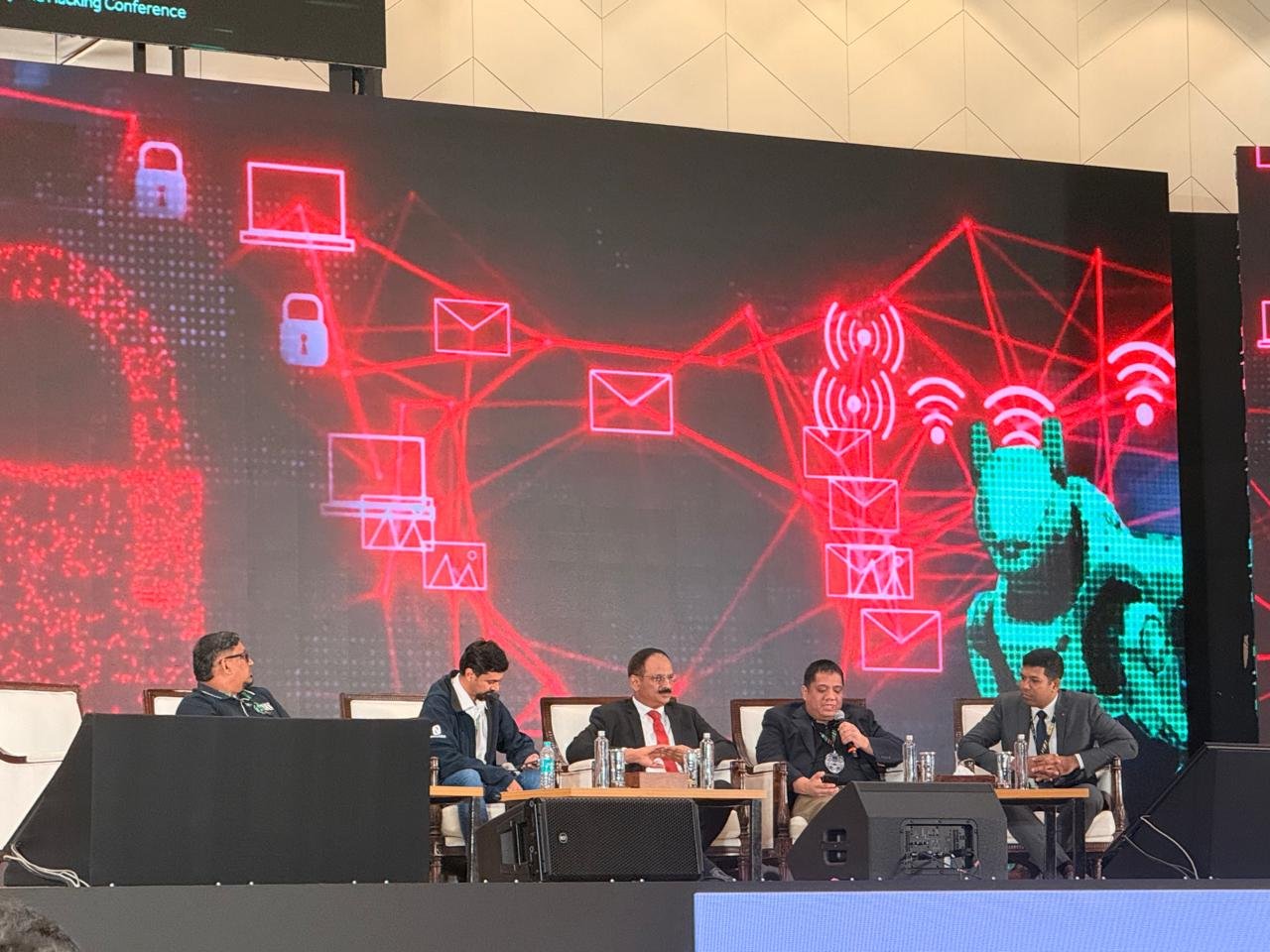Kochi, Kerala: As nations grapple with weaponized misinformation and AI-driven narratives, Lt Gen (Retd.) M. U. Nair, PVSM, AVSM, SM, Former National Cyber Security Coordinator, called for a new global and national framework built on trust, transparency, and collective resilience to counter the rising influence of “deep state” operations in the digital era.
Speaking at c0c0n 2025, one of India’s foremost cybersecurity conferences jointly organized by the Kerala Police and ISRA, Lt Gen Nair headlined a panel discussion titled “Countering the Deep State Narrative: Transparency, Trust, and Cyber Resilience.” The session also featured Antriksh Shah (Founder, Nullcon & Hardwear.io), Jairam Ramesh (Director of Cyber Security, AIA Digital+, Kuala Lumpur), Christopher Dio Chavez (Chief Hacking & Defence Officer, RADAR IT), and Ankit Ashokan IPS (Superintendent of Police, Cyber Operations, Kerala Police).
ALSO READ: India Unveils National Strategy To Combat Online Child Sexual Exploitation At C0C0N 2025
Technology Has Shrunk the Barriers to Manipulation
Lt Gen Nair, drawing from his decades of national security experience, said that technology has “democratized disruption,” enabling even individuals to manipulate public discourse, elections, and governance systems.
“Earlier, disinformation required networks, resources, and planning. Today, with AI and social media, even one individual can create the same effect. The barriers to manipulation have completely collapsed,” he warned. He emphasized that the challenge is no longer just about “cybersecurity” in the technical sense but about “trust security” — the need to maintain public confidence in legitimate institutions, data, and communication channels.
FCRF Launches CCLP Program to Train India’s Next Generation of Cyber Law Practitioners
Deep State Narratives Thrive in the Absence of Trust
Lt Gen Nair explained that what is often referred to as the “deep state narrative” is not merely a political or intelligence construct, but a manifestation of weakened societal trust — when citizens lose confidence in official information channels and turn to unverified alternatives.
“Misinformation gains ground where credibility declines. It’s not enough to have advanced cybersecurity systems; we must strengthen the bond of trust between the state and citizens,” he said. He argued that trust cannot be built during crises — it must be nurtured consistently through transparency, clear communication, and ethical governance.
Drawing parallels with global disinformation campaigns that have influenced elections and public opinion, he said, “Resilience isn’t about reacting to every narrative. It’s about ensuring our institutions, policies, and citizens are so informed and connected that falsehoods don’t find fertile ground.”
ALSO READ: “Empathy Is Being Weaponised”: Brijesh Singh Exposes Dark Side of Social Media at c0c0n 2025
From the Battlefield to the Digital Arena
Reflecting on his experience in India’s national security apparatus, Lt Gen Nair said disinformation has always been a weapon — from ancient warfare to modern geopolitics. However, digital platforms have magnified its scale, speed, and psychological impact.
“Today, a message from one corner of the world can influence minds globally in seconds. We are witnessing a transformation from battlefield deception to information warfare,” he noted. He stressed that AI tools have created new vulnerabilities, with deepfakes and synthetic media capable of eroding the very idea of truth.
“Technology has outpaced regulation. We must urgently create guardrails — not just technological, but ethical and human oversight mechanisms,” he said.
Human Oversight Must Remain Central
Reinforcing his belief in human control over machine-driven decisions, Lt Gen Nair cautioned that the “final authority” in interpreting and acting upon information should always rest with human judgment. “We cannot surrender decision-making entirely to algorithms. Whether in governance, finance, or defence, a human must remain in the loop,” he stated.
He proposed a framework based on People, Process, and Technology, where awareness, governance, and system checks evolve together. “Countering disinformation isn’t just about faster fact-checks — it’s about cultivating discernment among people,” he said, highlighting education and digital literacy as the most sustainable weapons against fake narratives.
Global Cooperation Needed to Authenticate the Digital World
The retired General called for a global council or trust framework to authenticate digital content, emphasizing timestamps, device-level data verification, and standardized provenance. “We need a globally accepted mechanism to validate what’s real and what’s synthetic. This is not utopian — it’s essential for the future of democracy and digital governance,” he asserted.
He warned that the absence of such global protocols could lead to “epistemic chaos” — where people no longer agree on basic truths.
“If the world cannot distinguish between human-created and machine-generated information, governance and democracy will both be at risk,” he added.
The Broader Discussion: Industry, AI, and Collective Responsibility
Other panellists supported Lt Gen Nair’s call for transparency and accountability. Jairam Ramesh highlighted the importance of AI disclosure norms, urging that “every AI-generated artefact must be traceable.”
Ankit Ashokan IPS emphasized awareness and education as critical tools to build social immunity against misinformation. Antriksh Shah and Christopher Dio Chavez discussed how corporations can either amplify or mitigate disinformation through their algorithms and data policies, calling for “corporate responsibility as much as cybersecurity readiness.”
Building a Resilient Information Ecosystem
Concluding the discussion, Lt Gen Nair reiterated that cyber resilience begins with societal trust, not just firewalls or technology.
“Trust is the ultimate firewall. Once we lose it, no amount of encryption can secure our systems,” he said.
He urged governments, corporations, and global institutions to collaborate on information authenticity, ethical AI governance, and citizen awareness — calling it the “trinity of transparency, trust, and resilience” that will define the future of cybersecurity.



